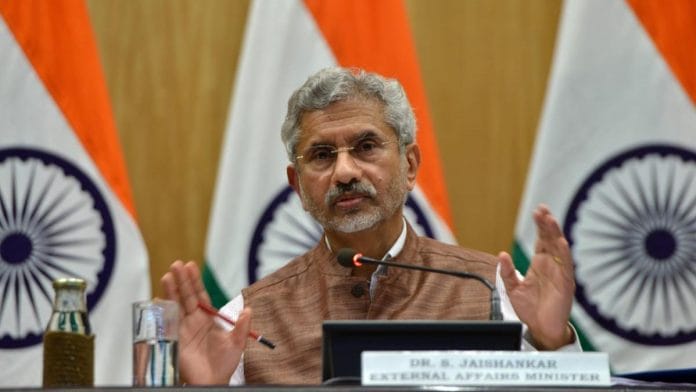New Delhi: The Quadrilateral Security Dialogue or Quad is looking at “practical subjects” facing the world today, and is a “contemporary arrangement” looking at present-day issues, External Affairs Minister S. Jaishankar said Tuesday.
The Quad, comprising the US, India, Japan and Australia, was formed as a new bloc against rising Chinese belligerence post the pandemic in order to build resilient supply chains.
“Last year has shown that the Quad is very much for real … I think it has moved very effectively and to my mind it has moved well precisely because it is a very contemporary arrangement, it is loose, it is creative, it is open-minded… It’s a new way of working not just for us but for the other three Quad partners that we have,” Jaishankar said Tuesday at the Global Technology Summit (GTS) 2021.
The GTS 2021 has been organised by Carnegie India and the Ministry of External Affairs. ThePrint is the digital partner.
Jaishankar, who was addressing the topic Geopolitics of Technology, also said that the outcomes of the Quad are “practical subjects, which will make a difference”.
“Producing a vaccine, implementing a connectivity project, facilitating student mobility, looking at promoting start-ups, technology collaboration — we (Quad) have taken a sensible view of the landscape, problems of the landscape and said how do we find a more effective solution,” he explained.
He said decoupling with China “is much easier said than done” as companies and businesses are now entwined with each other, when asked about both Indian and Chinese economies decoupling in the wake of growing tensions between Beijing and New Delhi.
“Decoupling is the wrong description … What you are going to see is not decoupling, what you are going to see to some extent is hedging and de-risking with short supply chains,” the minister added.
On the issue of New Delhi entering several small groups such as the recently announced grouping among India, Israel, the US and the UAE, Jaishankar said, this will be “more technology focussed”.
Also read: India, Sri Lanka ties complicated from Ramayana times but our tensions are low: Envoy Moragoda
Takeaways from Covid pandemic
Jaishankar said orthodox international relations with national competition have come into conflict with the mantras of globalisation, “where the virtues of it were so self-evident that we were supposed to keep everything else in abeyance”.
“This is really the big debate which has unfolded in a way, due to a certain set of actions and reactions. So we are confronting today a very different world politically,” he said.
The minister added that with the Covid-19 pandemic, countries started shutting down their economies or raised barriers. “Suddenly we all woke up to the extent of our exposure and then you had to ask yourself, should any country be actually risking your national security by having such a huge exposure to foreign sources so that tomorrow, God forbid something happens, you are totally stuck.”
The big takeaways from the Covid pandemic, according to Jaishankar, were shorter supply chains and more national capacities.
“Years of a certain kind of economic logic caught us in a situation where we were unprepared with basics when the Covid hit us,” he said, adding, “what we did in the last two years is actually incredible.”
Also read: India sends medicine to Afghanistan, Taliban says ‘thank you’, relations ‘very vital’
Importance of building partnerships and national capabilities
According to Jaishankar, the contention between building international partnerships and developing national capabilities does become a challenge when it comes to becoming more protectionist or being more globalised.
“The fact is a country the size of ours with the potential that we have and the ambitions that we have, it cannot be that we don’t have a robust, liable capacities which are continuously upgraded. You are open to a point where those capacities get hollowed out,” he said, adding that this happened in India where the domestic industry has not been allowed to grow with the growth of the economy.
“You don’t do partnership for the sake of partnership … The more capabilities you have, the more attractive you are as a partner,” he added.
Jaishankar highlighted that in order to become part of the global supply chains, India needs to first strengthen its own domestic supply chain networks.
“We need to continuously strengthen our domestic supply chain. We cannot have economic growth without deep strengths, without commensurate economic growth. Jobless growth is not growth,” he said.
Also read: No Biden-Imran call, ‘solidarity’ with China — why Pakistan opted out of US Summit for Democracy
US support for India’s nuclear technology
According to Jaishankar, the US support for India and Washington’s eventual strategic embrace of New Delhi came with the signing of the Civil Nuclear Deal and that to him was not “surprising” and neither was it “counterintuitive” vis-à-vis India’s relationship with China, which has reached nadir in the present day. The India-US Civil Nuclear Deal, also called the Agreement for Cooperation Concerning Peaceful Uses of Nuclear Energy or the 123 Agreement, was signed in October 2008.
“I think those of us who saw the global currents change, who realised that US was beginning to recalculate its relationships in the world and had discovered a certain value in its relationship with India, for them it was not counterintuitive. I think they sensed it coming. I think those who were much more fixed or dogmatic in their view of the world found it hard to do this,” he said.
He added: “If you are hard-headed, if you monitored outcomes, if you actually looked at history and drew the right conclusions, to me what happened wasn’t surprising. It went exactly as the analysis would say it would go.”
(Edited by Poulomi Banerjee)
Also read: India-Russia ties are ‘back on track’ — that’s the message from Putin visit and 2+2 talks






